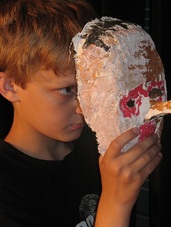What is drama therapy?

Drama Therapy is the therapeutic and intentional use of dramatic processes, such as storytelling, role-play, and improvisation, to facilitate personal growth, enhance self-worth, instill more appropriate behaviors, improve functioning, and reinforce proactive choices in a safe and flexible environment.
Through an active, experiential approach, drama therapists guide clients as they work through emotional disturbances, mental illness, trauma, family, social, educational, vocational, and community problems. Through the dramatic process, clients set and work toward measurable and achievable goals, learn to express feelings appropriately, improve interpersonal skills, and strengthen the various roles they play in their personal lives. When applied to addictions populations, drama therapy is especially effective, for it provides chemically dependent clients with an opportunity to safely practice the behaviors necessary for abstinence. HOW DOES DRAMA THERAPY MAKE A DIFFERENCE FOR PERSONS IN ADDICTIONS SETTINGS? Drama therapy promotes an environment in which addicted clients can openly express emotions,explore a drug-free future, develop communication skills, make personal connections, and practice honesty. Because it is action-oriented, drama therapy allows clients to act out negative behaviors, such as drug-seeking, and consider their harmful impact in a more concrete way than traditional treatment approaches, without consequences. Clients are urged not to rationalize or deny addiction; rather, through the dramatic process, they are challenged to face their issues directly and truthfully. Through drama therapy, clients have the opportunity to practice new skills, such as refusing drugs, and to imagine and take on new roles, such as a sober self. In addition, techniques such as role play and improvisation offer clients a fresh perspective on their behaviors, choices, and relationships. Clients explore and develop their innate strengths through theatrical techniques that offer the distance necessary to consider their addiction (and resulting issues) without feeling overwhelmed. Due to extended substance use, clients’ emotional development often stagnates at the age at which they became addicted. Many of these individuals also have a history of abuse and/or trauma. Drama therapy addresses such developmental issues through storytelling and embodiment, meeting clients where they are and helping them mature in an organic, patient, and creative manner. The process of drama therapy is both insightful and enjoyable. Because addicted individuals tend to be sensitive and creative people, they take quickly to the arts and thrive on being able to express themselves through movement, art, words, music, and drama. Drama therapy, said one client, “gave me a way to have excitement in my life without the use of drugs. I can have fun." By engaging in drama therapy, chemically dependent clients learn that they can have fun without being high. Clients who engage in drama therapy will develop the following:
|
What do professionals say about drama therapy?
"Under the guise of play and pretend, we can - for once - act in new ways. The bit of distance from real life afforded by drama enables us to gain perspective on our real-life roles and patterns and actions, and to experiment actively with alternatives." -- Renee Emunah, PhD, RDT/BCT Director, Drama Therapy Program, California Institute of Integral Studies "Participants can enjoy the feelings of being in another person's shoes - playing another role - as well as learn the liberating experience of expanding their own primary roles in life." -- Patricia Sternberg, MA, RDT/BCT Director, Developmental Drama Program, Hunter College Drama therapy is the intentional use of drama and/or theater processes to achieve therapeutic goals. Drama therapy is active and experiential. This approach can provide the context for participants to tell their stories, set goals and solve problems, express feelings, or achieve catharsis. Through drama, the depth and breadth of inner experience can be actively explored and interpersonal relationship skills can be enhanced. Participants can expand their repertoire of dramatic roles to find that their own life roles have been strengthened. What participants have to say: "The work I did in drama therapy gave me the stability and direction I needed to deal with personal issues stemming from child abuse, assaults and rape, and loss of self." -- Cathy H. (abuse survivor) "Drama showed me how to interact with others. Most of all, it gave me a way to have excitement in my life without the use of drugs." -- Kurt M. (recovering drug addict.) "Often our residents do not recognize their aggressiveness or hostility until it is explored in drama therapy." -- Duane T. Bowers, Director of Second Genesis Residential Facility "As someone who is schizophrenic, I've always been told that I shouldn't use my imagination. With drama, I get to use my imagination and it helps me. " -- Sue P. (student) "I cannot put into words how wonderful this drama experience has been for my daughter. I have seen the child we knew was inside, but which we rarely saw at home, come out." -- Mother of adolescent with Asperger's Syndrome How can drama therapy help those with addictions? How can drama therapy help children and adolescents? These fact sheets are courtesy of the North American Drama Therapy Association. |
